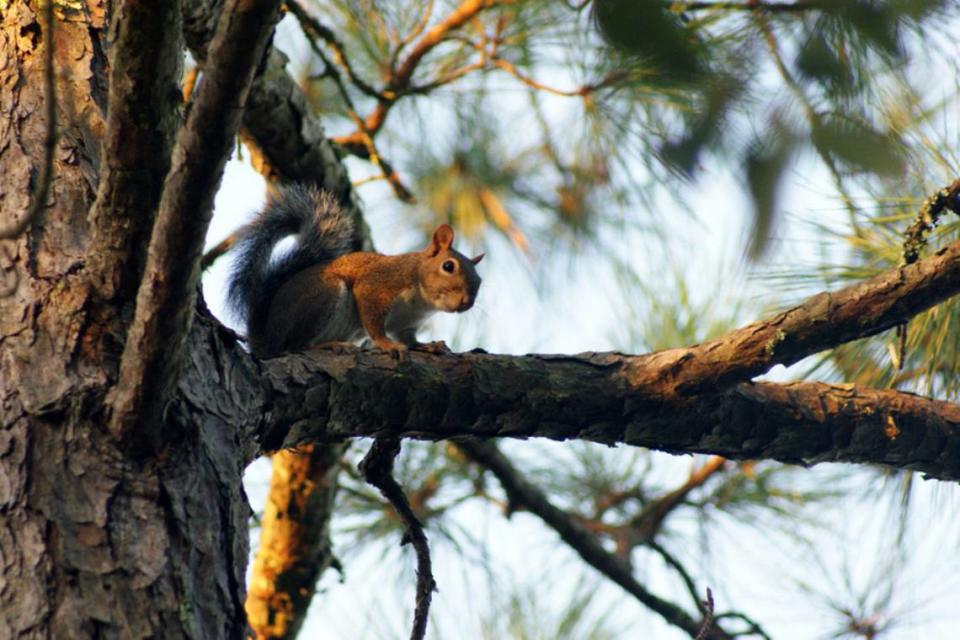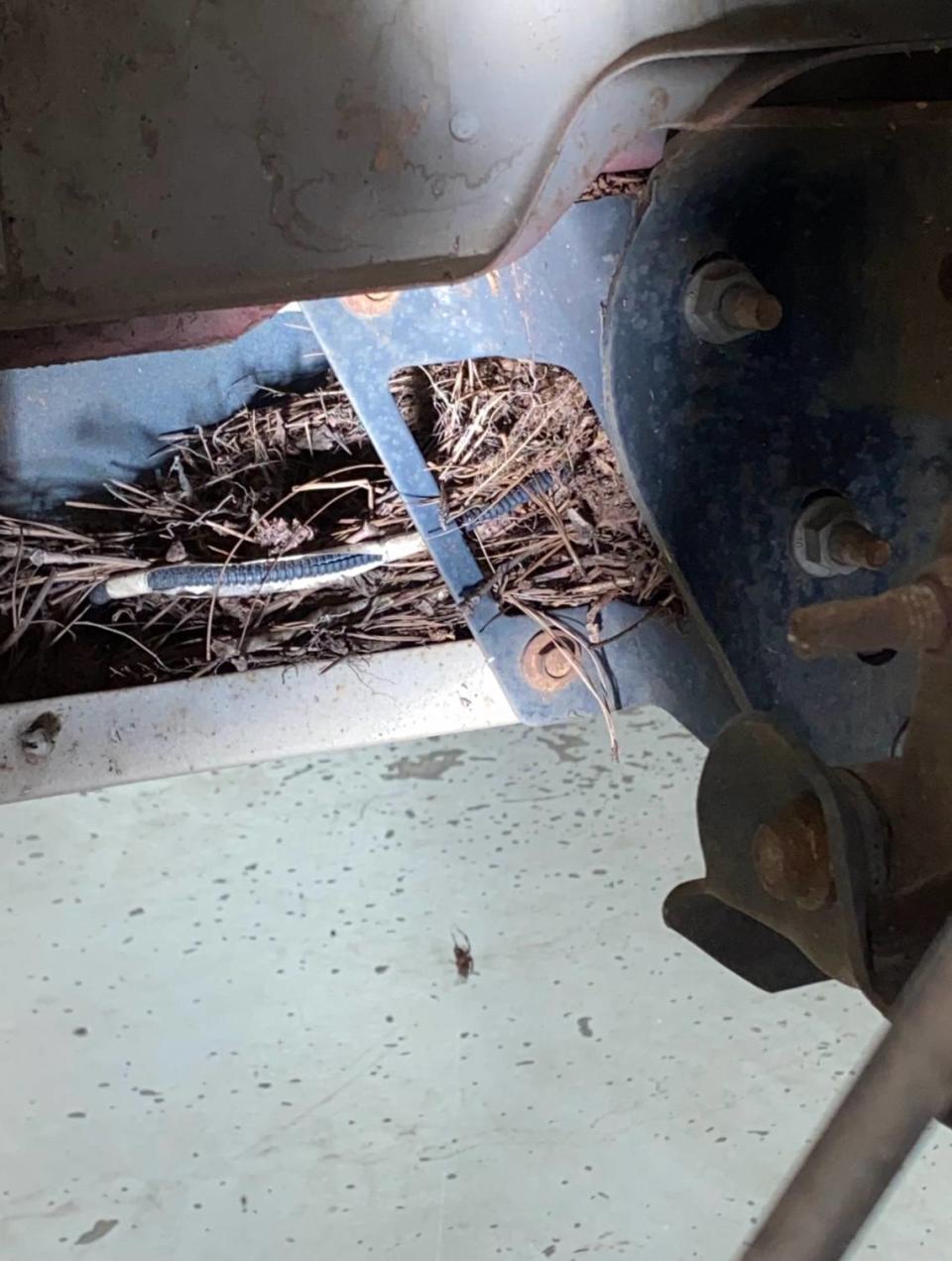Squirrels love chewing car wires. Here’s why — and how to get them to stop
The latest in our Asked & Answered series, in which we answer questions from the community, looks into car damage by rodents — specifically squirrels.
Apex resident Donna Provance let us know she and her longtime partner Erik Lechak dealt with squirrel-inflicted damage to their 2001 Ford Ranger last month.
“This never happened in 20 years of living here, then it happened twice in two weeks,” Provance told The News & Observer.
“We’re reading up on how to make sure this doesn’t happen again — I mean, we had to pay $550 and $200 for the repairs — but we’re getting conflicting advice online.”
Provance asked The N&O if any experts have surefire advice to keep the squirrels away without harming them.
The N&O spoke with experts at Cary Car Care, the NC Museum of Natural Sciences and car insurance companies to learn more about why squirrels want to chew your car lines, plus get some advice on how to stop them (to the best of your ability) from making your car potentially undriveable.
Why do squirrels chew car lines?
It is widely believed that rodents are attracted to soy-based insulation used to cover wires in many cars, but there is little actual evidence to support that theory.
Rodents (including squirrels) need to continually chew on something to whittle down and sharpen their teeth, which never stop growing. The word “rodent” comes from the Latin word “rodere” — to gnaw. Other rodents, especially mice and rats, can be equally to blame.
“Wires in cars, plus some of the plastic in your car, is nice and hard to chew on, and in many cases something like wire is easy to manipulate in their hands to put in a position to chew,” said Michael Cove, research curator of mammalogy at the NC Museum of Natural Sciences.
“If they are chewing for food, it will likely be to get food inside of your car and not to eat the wires themselves. But most of the time, it’s just to chew and gnaw.”
Cove has a personal story of squirrels chewing up his car to get to some food inside. He and his wife bought a large bag of sunflower seeds home to feed their goats, and they left the feed in their trunk all weekend. The squirrels, delighted to find a treasure trove of hard-shelled seeds, chewed clean through the bumper to get inside the car and feast.
“It’s the consequence of there being lots of squirrels in heavily populated human areas, and they’re looking for things to chew. Our cars and homes coincidentally have extra hard stuff compared to the natural world,” he said.
The best squirrel deterrent? Move your car.
This is the most foolproof way to teach squirrels and other rodents that your car is not a stationary object (like a tree) to which they can keep returning.
“Leaving your car standing still anywhere for an extended period of time is begging for squirrels, Carolina Wrens, house mice, house rats to investigate and check it out. Moving it consistently helps for sure,” Cove said.
Kelsey Lambdin, co-owner of local mechanic shop Cary Car Care, agreed stationary cars are targets. This issue was exacerbated during the pandemic when people weren’t driving as much, and cars that used to be out of the house all day were now sitting in the driveway for weeks, if not months, at a time.
If you’re not taking your car on the road every day, the solution can simply be moving the car between your driveway and street every few days.
Provance said she learned this advice after her two repair bills, and she began switching up their Ford Ranger’s location around the driveway: “No more leaks to our knowledge!”
Here are some other ways to deter squirrels and other rodents from chewing on your car:
• Get rid of all food: Rodents can chew through nearly any part of a car to get inside and eat your snacks.
“I would absolutely recommend not leaving any food in your car ever, since it doesn’t take much for animals to get in there. Rats and mice are more likely to eat things in cars than squirrels,” Cove said.
“While squirrels are looking for food, chewed wires is usually a casualty of the search.”
Plus, squirrels can live in urban environments without a lot of trees, so they may have competition to make their dreys, or squirrel nests. If you leave food in your car, it can attract squirrels to use your car to build theirs.
• Use natural deterrents: Since the goal is to disgust squirrels and not kill or poison them, you should use natural deterrents. This can include clove oil, cinnamon oil, peppermint oil or cayenne pepper applications.
• Look into rodent tape: Honda’s rodent-deterrent tape is essentially electrical tape with spicy capsaicin, which Honda describes as “the stuff that puts the fire in a bowl of five-alarm chili,” Consumer Reports wrote. Honda sells the tape for about $50 for 65 feet.
“Wrap any trouble spots to prevent any future wire harness issues. The tape is treated with capsaicin (active component in chili peppers). When wrapping the harness it is recommended to use the half-wrapping method. Each time you wrap the tape around the harness overlap the previous layer by half the width of the tape,” Honda says.
• Keep an eye on your birdfeeders: They’re squirrel attractants, so if you already have a high density of squirrels around your home, adding a birdfeeder will likely draw them to your space, Cove said.
“There are kinds of bird seed made with hot pepper, cayenne pepper, to deter squirrels from eating it. If you’re using that spicy bird feed and don’t see squirrels around the bird feeder, I’d recommend finding what kind of squirrel deterrent they use on the bird seed and apply that same natural remedy to your car.”

Can squirrels severely damage your car?
Yes. There are some telltale signs you should look closely at your car before driving:
“Anytime you get in your vehicle to drive, you should make sure you don’t see anything new where it was parked — new fluid on the ground, new pieces of plastic, rubber, debris. Especially if it hasn’t been driven in days,” Cary Car Care’s Lambden said.
Brake lines and fuel lines are common spots for squirrels to chew.
“Fuel leaks are a fire hazard, and a brake leak can lead to your brakes failing. Both of these situations are extremely dangerous,” she said.

How expensive is it to repair squirrel damage to cars?
A ballpark figure would be a few hundred to a few thousands of dollars, depending on the severity of the damage and what was affected, Lambdin said.
“The most devastating and expensive [repair] is when they chew through wires, fuel or brake lines,” she said.
Is squirrel damage to cars covered by insurance?
Rodent damage is typically covered under comprehensive coverage, as long as comprehensive coverage is available on the policy at the time of the loss, said spokespeople for State Farm, the NC Farm Bureau and the NC Department of Insurance.
Comprehensive coverage helps pay to replace or repair your vehicle from damage not caused by a collision. It’s sometimes called “other than collision” coverage.
Squirrel and rodent damage is a common claim that insurance companies see often, said Scott Reece, NC Farm Bureau’s regional claims manager.
Triangle Asked & Answered: What do you want to know?
Have a question about something in our community? The News & Observer’s Service Journalism team wants your questions for our Triangle Asked & Answered series. Reach out to us by filling out this form or by sending an email to ask@newsobserver.com.
2023 Outdoor Music Guide: These Grammy-winning artists hit Triangle venues this summer
A list of 2023 summer music festivals across North Carolina. Some are free!

